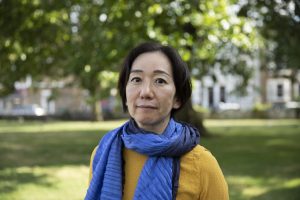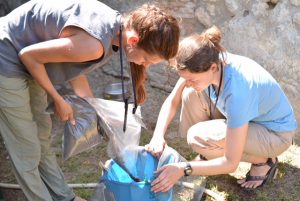Reading Classics celebrate the International Women’s Day 2022 with an exploration of the variety of female presence in ancient texts and their receptions as well as in authorship around mythical stories. Professor Barbara Goff, whose research has thoroughly examined the role of women in ancient Drama and beyond, in different contexts, historical circumstances, and societies, has recently delivered a public lecture at the Belfast Hellenic Society on three contemporary women writers engaging with ancient tradition. Keep reading for her account of the ways in which women rediscover their place in the long and ever-changing course of literature.
In early March I went on a plane for the first time since 2019 and flew to Belfast, where I was hosted by the Belfast Hellenic Society. I am indebted to the Society, and especially Maureen Alden, for their wonderful hospitality. It was fitting that I gave my public lecture in the Canada Room and Council Chamber, in the imposing Lanyon Building, because it is adorned with a big mural of women from the University, titled ‘Out of the Shadows’. My talk was on three of the recent novels by women writers that channel, and challenge, the Homeric tradition: Madeline Miller’s Circe (2018), Pat Barker’s The Silence of the Girls (2018) and Natalie Haynes’ A Thousand Ships (2019). Although these are very different from one another, they all experiment with the idea of a ‘new song’, a version of the well-known epic story that is made different because told by a woman or women, and from a female perspective.
The Council Chamber at Queen’s University Belfast, Lanyon Building
Classicists will know that the idea of a new song sung by women is not straightforward. The chorus of Euripides’ Medea claims that for women to sing, the whole world has to be turned upside down:
Upwards flow the streams of holy rivers
and justice and everything is turned backwards.
The plans of men are tricky, and oaths
to gods no longer hold firm.
Speech will change to hold my life in good repute.
Honour will come to the female race;
The muses of old singers will cease to hymn
my faithlessness.
For not to our mind
did he grant the divine music of the lyre
Apollo, the leader of songs; then I would have sung a song
in answer to the race of men.
Now women can sing, say the chorus; but as we know, they are men, in costume. And we don’t really know what the new content of a women’s song would be; just before this song, Medea says, in perhaps somewhat misogynistic vein:
In addition we were born
women, most helpless for noble things
but of all sufferings the most clever artificers.
The new novels, I suggested in my talk, do not make things very much simpler.
 The first-person narrator of Circe makes it very easy for readers to question her telling of her own story; she regularly tells us that she leaves things out and changes the story as she goes. The ending of the novel – spoiler alert! – throws into doubt the precise identity of the narrator.
The first-person narrator of Circe makes it very easy for readers to question her telling of her own story; she regularly tells us that she leaves things out and changes the story as she goes. The ending of the novel – spoiler alert! – throws into doubt the precise identity of the narrator.
 In A Thousand Ships, the Muse Calliope engages in a long-running battle with ‘the poet’ (he’s unnamed, but he is blind…) over exactly what song he will sing. So, when the novel relays all the stories of the women caught up in the Trojan War, is that the song of the poet, or of Calliope, or is it something else entirely? Calliope herself seems a bit confused, because although she wants to memorialise all the women of the war, she gets fed up when the poet wants to sing about Helen.
In A Thousand Ships, the Muse Calliope engages in a long-running battle with ‘the poet’ (he’s unnamed, but he is blind…) over exactly what song he will sing. So, when the novel relays all the stories of the women caught up in the Trojan War, is that the song of the poet, or of Calliope, or is it something else entirely? Calliope herself seems a bit confused, because although she wants to memorialise all the women of the war, she gets fed up when the poet wants to sing about Helen.
 In Silence of the Girls, Briseis is the first-person narrator, but the novel sets up a long-running contest between her ‘song’ and the epic songs that celebrate men’s victories and sufferings. Thus she remembers a song that Achilles sang before his death:
In Silence of the Girls, Briseis is the first-person narrator, but the novel sets up a long-running contest between her ‘song’ and the epic songs that celebrate men’s victories and sufferings. Thus she remembers a song that Achilles sang before his death:
The words seemed to have got trapped inside my brain, an infestation rather than a song, and I resented it. Yes, the death of young men in battle is a tragedy…worthy of any number of laments – but theirs is not the worst fate. I looked at Andromache, who’d have to live the rest of her amputated life as a slave, and I thought: We need a new song.
But even having sung that new song, Briseis is unsure that it will work. At the very end of the novel, she concludes that future audiences will not want to hear her side of the story; they won’t want to hear ‘about the massacres of men and boys, the enslavement of women and girls’ and instead will want to listen to something much less challenging. When the novel concludes ‘now my own story can begin’ it is ironic at least, because these are the last words of the novel.
So rewriting the Homeric tradition from the female viewpoint is not necessarily a straightforward enterprise, but the critical and popular reception of these novels shows that it is a highly resonant undertaking that has won over huge audiences. My audience in the Canada Room was inspired to do more reading, which is always encouraging – the poet Michael Longley, whom I met at the event, said he would rush back to reread the Medea. As classicists we can relish new works, as well as celebrating the ways in which the ancient texts provoke responses – among men as well as women!
‘Out of the Shadows’, Michelle Rogers, b. 1966. This work over three panels hangs in the Council Chamber at Queen’s. The 25 women depicted represent female staff, students and alumni of Queen’s, and was commissioned by the Queen’s Gender Initiative which works to improve the profile and position of women within the University.
























